Food Forensics- Food Contaminant Testing, Analysis, and Sourcing
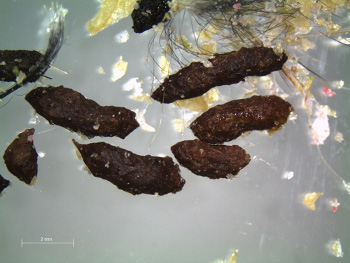
Unknown contaminants recovered from a dry food product.
What is Food Forensics?
Food forensics is the scientific testing or analysis of food products or food contaminants by a laboratory. Scientific testing can help manufacturers, insurers, suppliers, and consumers to confirm, identify, and source contaminants or unusual/unexpected product characteristics. Analysis, interpretation, and reporting should conform to the highest scientific standards. Quality analysis can withstand the scrutiny of litigation or scientific review.
Why Consult a Food Forensics Testing Service?
Food forensic analyses can quickly provide useful factual information to food manufacturers, restaurants, suppliers, consumers, and insurance companies. A third-party food testing laboratory can provide independent and scientifically supported results. Microtrace has decades of lab experience with food analysis and forensic investigations covering a vast range of food contaminant materials. Moreover, our expert food forensic reports are easily comprehensible, yet, can withstand the scrutiny of litigation or a scientific review. Our lab addresses a wide variety of food-related questions, including:
- Is it foreign matter (food contamination)?
- What is the food contaminant?
- Is the contaminant what a consumer claims?
- When was the item or contaminant introduced to the food product?
- What is the source of the contaminant?
- Was the item cooked or processed with the food product?
- Is there blood, saliva or another bodily fluid on the contaminant?
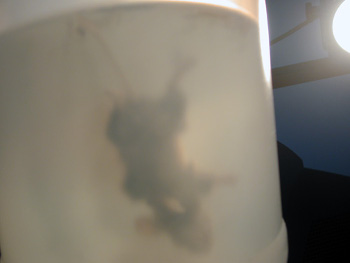
Alleged mouse in a container of product.
At Microtrace, our experts conduct food analysis and testing in our purpose built, ISO 17025 accredited laboratory. Microtrace’s lab combines state of the art equipment, unparalleled physical reference collections, and decades of experience. Our lab can analyze food or beverage samples, whether an issue involves a solid, liquid, or volatile. Food contamination is an issue facing all manufacturers in related industries. Whether a food contaminant is identified by quality control at a manufacturing facility or a consumer complaint, Microtrace can help. Our forensic food analyses combine the scientific analysis of food and alleged or actual contaminants with the scrutiny expected in a criminal forensic investigation. Common topics include:
Analysis of Foreign Matter (Contaminants) in Food Product
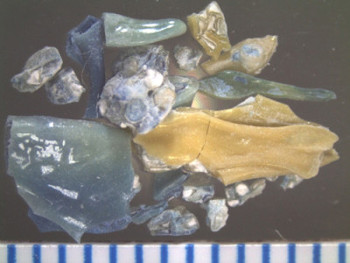
Unknown contaminant recovered from a milk bottle.
Foreign objects are a common consumer complaint, and can be introduced at any stage, from processing to consumption. Over thousands of food forensic analyses, our experts have encountered a wide variety of contaminants in food products. These include glass, metal, hair, plastic, insects, char, off-spec ingredients, animal parts, drugs, tooth, bone, gastric contents, fecal matter, bodily fluids, and plant tissue. We frequently encounter these contaminants in testing for food manufacturers or when examining evidence in criminal forensic cases. Forensic food analysis can range from a basic identification or verification to a detailed characterization. The latter may be necessary to identify a source or provide support for litigation.
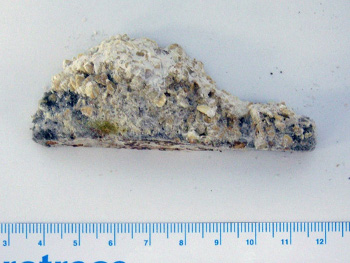
Unknown contaminant recovered from a food product.
Off-Odor Food Testing
Some claims involve sensory complaints of off odor, bad taste, or even discoloration of a food product or beverage. Subtle differences in chemistry can impact the flavor or appearance of a product. For instance, changes in product formulation, ingredient supply, storage conditions, shelf life, contamination, or tampering may cause these changes. Read more.
Food Contaminant Source Determination
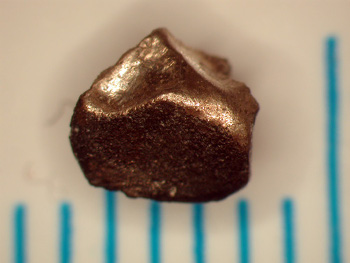
Metal found in a product identified as a dental amalgam.
Source determination of a contaminant’s introduction point is often a significant and contentious issue. In consumer complaints, testing can help determine whether a contaminant was introduced before or after a product was opened. In internal investigations, sourcing questions may involve specification of a particular facility or process within a facility, a particular supply chain, or even a particular geographical region. Therefore, Microtrace works closely with its clients to isolate potential introduction points, through collaboration and rigorous analysis.
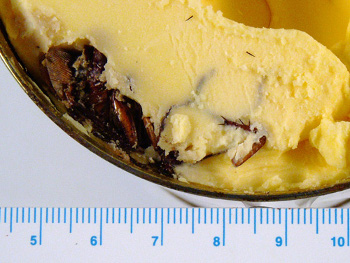
Alleged animal parts in a food product.
Full Service Food Analysis Lab
Microtrace provides an unparalleled range of experience and analytical tools. These range from assisting clients with sample preservation, to analysis and reporting, through litigation. Our results stand up to the scrutiny of scientific review and litigation. Yet, our reports present results in a way that both consumer affairs professionals and consumers can understand.
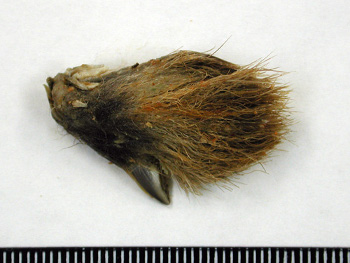
Animal part found in a product.
Food Forensic Submissions
Microtrace has been providing rigorous and scientifically-supported testing of food products and providing expert testimony for more than 25 years. Our experience with food and contaminant analysis in a wide variety of environments has given us a unique and expert perspective when reviewing, testing, or even retesting products. Our experts conduct all work in our ISO 17025 accredited laboratory.
Microtrace accepts and regularly analyzes food, food-related products, and contaminants in every imaginable context. Our lab specializes in unusual cases. We recognize that every investigation has its own sampling conditions and parameters. Because of this, our lab has developed the capabilities and expertise to accept a wide-variety of materials for testing and analysis.
Microtrace serves a wide range of clients from manufacturers, suppliers, and restaurants to insurance companies, and even consumers in civil cases.
In the case of consumer complaints, manufacturers and producers will want to ensure sample integrity and chain of custody. For this purpose, Microtrace can send sample retrieval packages (cold or ambient) directly to the consumer. These packages contain detailed instructions to assist the consumer with packaging and shipping the samples directly to Microtrace.
We ask that a completed project submission form accompany all food and food related submissions.
Our laboratory’s standard turn-around-time is 7-10 business days. However, Rush (2-3 days) and Ultra-Rush (same-day) options are also available.
Competitive pricing available upon request.
Please contact us to discuss the specific needs of your project.
Related Standardized Methods for Food Testing
Related AOAC International Standardized Food Testing Processes: Food Composition; Additives; Natural Contaminants, General categories 25 to 50.
Related ASTM Standardized Food Testing Processes: E1346-16, E1627-19, E1810-12, E1871-17, E1885-18, E2139-05(2018), E2164-16, E2263-12(2018), E2610-18, E2946-13, E3000-18, E3009-15e1, E3087-18, E460-12, E544-18, E679-19
How May We Help You?
Contact usto discuss your project in more detail.







